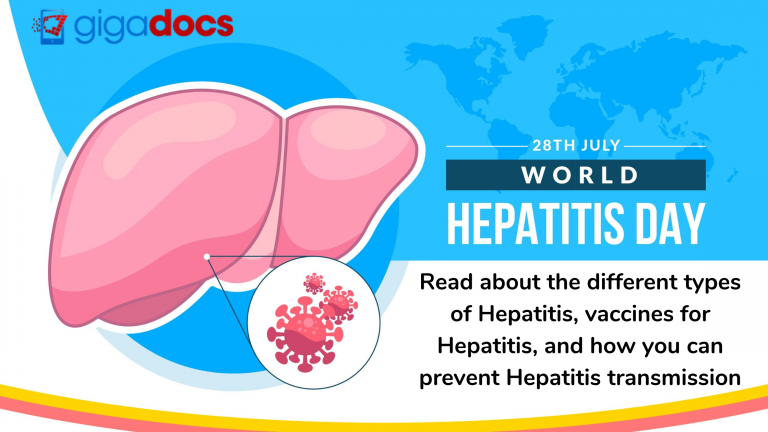In this blog, let’s learn more about Hepatitis, World Hepatitis Day, Hepatitis vaccines, and how to get tested for Hepatitis. Let us begin with the various types of Hepatitis-
What are the Different Types of Hepatitis?
Hepatitis A- Fever, fatigue, nausea, vomiting, abdominal pain, dark urine or clay-colored bowel movements, joint pain, and jaundice are all Hepatitis A symptoms that typically appear 2 to 6 weeks after the virus enters your body and last from 2 to 6 months.
Hepatitis B- The symptoms are similar to those of hepatitis A, usually appearing three months after infection. They could appear anywhere between 6 weeks and six months later. Symptoms can be mild and last only a few weeks in some cases. For some people, the hepatitis B virus remains in their bodies and causes long-term liver problems.
Hepatitis C- Early symptoms are similar to hepatitis A and B, appearing 6 to 7 weeks after the virus enters your body. However, they could appear anywhere between 2 weeks and six months later. About 25% of people who contract hepatitis C recover without treatment. In other cases, it persists for years. When this happens, your liver may be harmed. Remember that even if you don’t appear to be sick, you can spread all types of hepatitis.
The Severity of Hepatitis C
Chronic hepatitis C may cause silent harm to your body after infection. Symptoms may not appear for years or even decades. Once you do, the virus has most likely harmed your body in various ways, the most common of which are Liver Problems, which are discussed further below.
Problems with the Liver
The infection has the greatest impact on your liver. The virus causes it to swell. Without treatment, approximately 75% to 85% of people with an infection develop long-term chronic hepatitis C. If left untreated, the condition can progress to cirrhosis, liver scarring, liver cancer, and liver failure.
- Blood and Vessel Problems
Cryoglobulinemia is a common complication of hepatitis C, which occurs when specific proteins in your blood clump together in cold weather. The condition can cause skin, organs, nerves, and joint problems. Hepatitis C causes blood problems. You might not produce enough white blood cells to fight infections or platelets to help your blood clot. You may also bruise easily or develop red or purple spots under your skin due to the condition.
- Cancers
Hepatitis C patients are more likely to develop non-lymphoma. Hodgkin’s cancer begins in the immune system. The virus also increases the risk of liver and bile duct cancer.
- High Blood Sugar levels
Hepatitis C can make it difficult for your body’s cells to absorb sugar from food. Your pancreas will produce more insulin, a hormone that aids in transporting sugar into your cells which means that too much sugar will remain in your blood. Your body may eventually stop responding to the effects of insulin. Both of these can result in type 2 diabetes.
- Muscle and joint pain
Arthralgia is a type of joint pain common in people with hepatitis C. It is not the same as arthritis, which causes joint pain and swelling. However, infected people can develop hepatitis C-related arthritis. Fibromyalgia, which causes muscle pain and body aches, is also common in people with hepatitis C.
- Kidney Illness
People with hepatitis C are approximately 40% more likely than those who are not infected to develop long-term kidney disease. If you have untreated hepatitis C and kidney problems, you are twice as likely to require regular blood-filtering treatments, known as dialysis, in the future.
- Heart Issues
Hepatitis C has been linked to artery hardening, also known as atherosclerosis. It increases your chances of having a stroke, heart attack, or other heart problems.
- Problems with Mental Health
Hepatitis C can also have an impact on your mental health. You may have difficulty remembering things or paying attention. You may also feel exhausted and worn out.
- Nerve Issues
Peripheral neuropathy is nerve damage that causes pins and needles, numbness, or burning sensations in your hands or feet. Another condition known as paresthesia is tingling or numbness in your skin.
- Osteosclerosis
This painful but uncommon condition causes your body to form new bone faster than it can absorb. It primarily affects the feet and legs.
- Arthritis Rheumatoid
The hepatitis C infection stimulates your immune system, allowing it to fight the virus. Your immune system remains active as the virus multiplies in your blood and liver, which can lead to a diagnosis of rheumatoid arthritis and other rheumatic diseases.
- Skin Issues
Skin conditions caused by Hepatitis C can cause bumps, blisters, hair loss, itching, and light or dark patches. Vitiligo is a common condition that causes color loss on the face, elbows, knees, and wrists.
World Hepatitis Day
Every year on July 28, World Hepatitis Day aims to raise global awareness of hepatitis — a group of infectious diseases known as hepatitis A, B, C, D, and E- to encourage prevention, diagnosis, and treatment. Hepatitis affects hundreds of millions worldwide, causing acute and chronic diseases and killing nearly 1.34 million people yearly. Hepatitis can cause both acute and liver inflammation and can be fatal. Hepatitis B is the most common cause of cirrhosis in some countries and may also cause liver cancer.
Vaccines and Vaccination Schedules according to the Type of Hepatitis.
Vaccine for Hepatitis A
The HAV vaccine can protect against hepatitis A. This vaccination is given to infants between 12 and 23 months. Unvaccinated children over the age of 23 months, adolescents, and adults should all receive this vaccine. A doctor will administer the vaccine in two doses, six months apart.
Vaccine for Hepatitis B
The HBV vaccine is a routine shot that usually immunizes people for life. The first dose is usually given at birth; the remaining doses are administered at six months. Unvaccinated children and adolescents under the age of 19 should also be vaccinated. Some adults who have not been vaccinated should get the vaccine, such as those traveling to areas where hepatitis B is common. A doctor may give the hepatitis B vaccine in two, three, or four doses.
Vaccine for Hepatitis C
There is currently no vaccine available for hepatitis C, which causes 2 million new infections worldwide each year. Scientists are, however, conducting trials to develop a vaccine.
Vaccine for Hepatitis D
The HBV vaccine can protect against hepatitis D, a hepatitis B co-infection. However, if a person already has chronic hepatitis B, the vaccine will not protect them from hepatitis D.
Vaccine for Hepatitis E
A vaccine to prevent hepatitis E virus infection has been developed and is licensed in China, but it is not yet available in the rest of the world. Doctors typically advise people suffering from this infection to rest well, drink plenty of fluids, eat well, and avoid alcohol. On the other hand, pregnant women who contract this infection require close monitoring and care.
Vaccine for Hepatitis G
Hepatitis G vaccine is currently unavailable.
Non-Infectious Hepatitis
Autoimmune and alcoholic hepatitis are examples of noninfectious hepatitis. Hepatitis is caused by an autoimmune disease in which the immune system attacks the liver. Autoimmune hepatitis is frequently inherited, but other factors such as viral infection or drug use can precipitate the condition.
The most common symptoms are abdominal pain, joint pain, fatigue, jaundice, and uneasiness. When the liver cannot cope with the level of toxins caused by excessive alcohol consumption, alcoholic hepatitis develops.
How Long Do the Hepatitis Viruses Survive Outside the Body?
- Hepatitis A viruses can survive outside of the body for months. Hepatitis B can live for at least seven days while still infecting people.
- Hepatitis C can survive on household and clinic surfaces for up to 6 weeks at room temperature. It can survive in the open air for at least four days.
Tests for Hepatitis
Some types of hepatitis heal on their own. Others develop into chronic cases, causing liver damage and cancer. A liver biopsy may be performed if your doctor suspects you have chronic hepatitis B or C. They will take a tiny piece of your liver with a needle and send it to a lab to be tested for liver damage. Testing for chronic hepatitis C is advised for anyone who:
- Was born between 1945 and 1965.
- Were given blood-clotting factor drugs before 1987
- Received blood transfusions or an organ transplant before 1992
- Has been on dialysis for a long time
- Has HIV after injecting illegal drugs
- Has a history of hepatitis C.
- Was born to a hepatitis C-infected mother
Hepatitis | Preventing Transmission
Washing your hands is one of the most effective treatments for hepatitis A. If you have hepatitis B or C, you must find ways to keep others from coming into contact with your blood. Follow these pointers:
- Cover any cuts or blisters.
- Dispose of used bandages, tissues, tampons, and sanitary napkins with care.
- Don’t share your razor, nail clippers, or toothbrush.
- If your blood gets on something, clean it with water and household bleach.
- Don’t give blood, organs, or sperm.
The sooner you are tested for chronic hepatitis, the sooner you can begin taking medication to reduce or stop the liver damage caused by the virus. Many people with hepatitis C have no symptoms; they are unaware they are infected, which makes it critical to see a doctor and be tested. Book the best Hepatologists and gastroenterologists on the Gigadocs app–
Download the Gigadocs App from-
- IOS App – apple.co/2W2iG4V
- Android App – bit.ly/33AQoR




